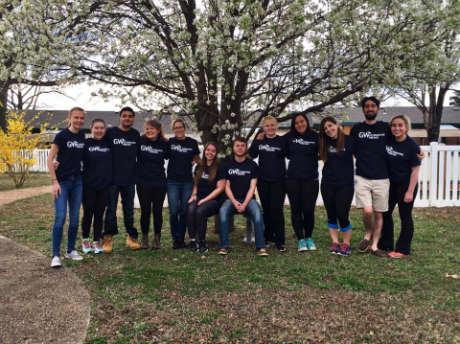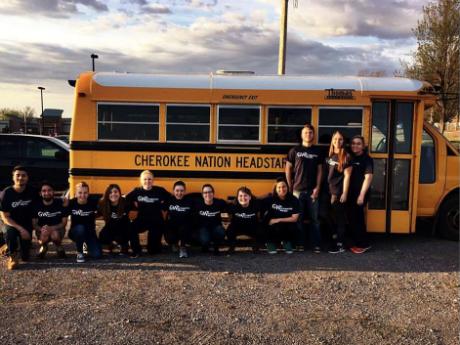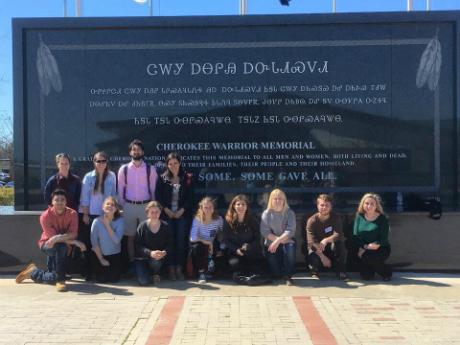As many students headed to beaches and sunshine during spring break, I served as a Learning Partner for GW Alternative Breaks in Tahlequah, Oklahoma, better known as Cherokee Nation. The trip focused on American Indian cultural issues and education. The trip partnered with the Cherokee Nation Head Start, whose mission is to “bring about a greater degree of social competence in children who may be disadvantaged.” As a Learning Partner, I worked alongside GW students in all aspects of service and learning throughout the trip, and provided guidance to our student trip leaders when issues arose. I was fortunate to serve with, and learn alongside, an amazing group of individuals.
Cherokee Nation and Oklahoma
Our trip began with a historical lesson about the Cherokee People. We visited the Cherokee Heritage Center where we learned about the creation of the Cherokee syllabary and how it has been adapted to modern technological uses today. Each of us downloaded the Cherokee language keyboard onto our phones so that we could practice the Cherokee syllabary throughout the service trip.
We learned about the forced movement of the Cherokee People during the Trial of Tears, which saw the removal of hundreds of thousands of American Indians from their native lands into states such as Oklahoma. The visit to the Heritage Center put into context the broader effect of the service work that we were doing on our trip.
At the end of the tour, we played a traditional Cherokee game called Stickball, known in the Cherokee language as the “Little Brother of War.” The game is very difficult, but I managed to score a point for my team!
Early Education with Head Start
Beyond the cultural learning component of our trip, our service focused on helping the Cherokee Head Start program. Head Start is funded partially through federal grants, but grantees are required to raise a certain percentage of in-kind donations in order to receive federal funding each year. Our work inside the classroom, from working with children to planting flowers to helping with simple maintenance and upkeep amounted to nearly $3,000! That is the amount it costs to run each Head Start classroom—with 8 kids each—for one month! It was wonderful to be able to see the direct monetary value that our service was providing to Cherokee Nation and their Head Start program.
Through our service inside the classroom, we learned of the issues facing the Cherokee Nation and Oklahoma as a whole. Many of the schools in Tahlequah are only able to operate 4 days of the week because they do not have enough money to pay teachers and staff to work a fifth day. Although many students begin high school, the graduation rates are falling each year as the amount of people living in poverty is increasing. We were able to speak with teachers, students, parents, and even government officials (we met the Chief!) on our trip about the problems facing the Cherokee Nation.
Impact on Me
Although many of the stories that we heard were ones of hardship, a prominent theme ran through them all: one of strength and hope. The Cherokee People are extremely strong and passionate about their culture, history, and community. The lesson that I took home with me from this trip is that although life may present you with tough situations, there is always a way to persevere. This trip truly was a once in a lifetime experience. I will carry in my heart and mind the people that I met and the stories and emotions that they shared for many years to come. Thank you to the Cherokee People who openly accepted us into their lives.







